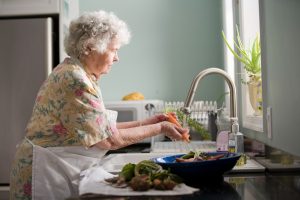
27 May 2021

Earlier this month, Ending Loneliness Together’s Vice Chair, Professor Johanna Badcock, alongside Advisory Group Chair, Professor John Pollaers OAM, caught up with Ending Loneliness Together member SilVR Adventures on the Aged Care Enrichment Podcast to discuss the hidden cost of loneliness.

We are all susceptible to feelings of loneliness at any age. Older adults may be particularly prone to loneliness due to life transitions common in later life, including the death of a partner, family or friends, retiring from work, financial pressures, deteriorating physical health, an increased likelihood of living alone, and generally having fewer close personal relationships. Changes to a person’s living environment, including moving to a retirement or residential aged care facility, can also increase feelings of loneliness.
Reflecting on his involvement in Australia’s aged care sector, Professor Pollaers notes the prominence of loneliness in the lives of older Australians. “Loneliness came up as probably the principle starting point for many mental health and physical health issues”.
“We shouldn’t forget that people who are ageing in place at home are not getting visitors, either”, said Professor Pollaers.
For Professor Pollaers, the rationale for addressing loneliness is clear. “If you’ve got that level of disconnection in the community, then we have to fundamentally rethink our approaches to social equity and inclusion in our infrastructure design and the development of social policy in our health response”.

What lies behind the apparent epidemic of loneliness in Australia? “What we do know”, said Professor Badcock, “Is that since the onset of the pandemic, from data that we’ve collected here in Australia… it’s getting to be significantly more likely that all age groups are reporting feeling lonely”.
While 1 in 4 Australians report problematic levels of loneliness, since the COVID-19 pandemic, this number has increased to 1 in 2 Australians. The COVID-19 pandemic has brought loneliness to the fore, and reminds us of just how important our social relationships are for our overall health and well-being.
Importantly, the pandemic has given many of us a license to talk more openly about our feelings of loneliness, said Professor Badcock. “It has given people a greater sense that they can talk about this issue. We do know that there is often a stigma attached to loneliness, and that plays out by way of making people reluctant to speak up about it, for fear of how other people are going to respond”.
“People are a little bit more willing to say, ‘you know what, this has really sucked, and I’m really feeling lonely’”, said Professor Badcock.

Feelings of loneliness are related more to the perceived quality, rather than the quantity, of a person’s social relationships. “Fixing the number of social connections that you have doesn’t always make you feel less lonely”, said Professor Badcock.
“What we do know is that when people are lonely, it can set off a kind of downward negative spiral. It changes your thoughts, your feelings, and your behaviour, so that you feel a bit more negative about yourself and the world around you.”
“Helping to address loneliness can therefore involve helping people to be a bit more aware and mindful of that kind of negative thought, belief, or action cycle, and how to intervene and change how you interpret the situation”, said Professor Badcock.
“Part of the anecdote is helping people to be able to take steps for themselves, but also to help others to take the time to check in and really be there for people”, said Professor Pollaers.

Amid increasing awareness of loneliness in older adulthood, virtual reality is gaining traction as an effective tool to improve the physical, psychological and emotional health of older adults.
“I think there’s a lot of positive scope for using virtual reality technologies to help people connect. I think you need to have a blend of that kind of a connection with face-to-face in-person connection to get the most benefit”, said Professor Badcock.
While the evidence indicates that virtual reality is effective for improving a person’s general well-being, further research is required to establish the link between virtual reality and loneliness. That doesn’t stop us having hope in its potential for positive change in the lives of everyday Australian’s. “You’ve just got to look at the smiles on people’s faces when they use it to know that it’s adding something”, said Professor Pollaers.
SilVR Adventures are one organisation working to develop the evidence-base for virtual reality to improve the social lives of older adults. “Seniors, especially those living in aged care homes, really need extra support in maintaining positive mental and physical health right now”, said SilVR Adventures Founder, Colin Pudsey.
Realising a shared vision for social connection, SilVR Adventures recently became a member of Ending Loneliness Together. “Our mission is perfectly aligned with ELT, so we’re delighted to be a member”, said Colin.
To listen to the podcast in full, navigate to Episode 17 of the Aged Care Enrichment Podcast.